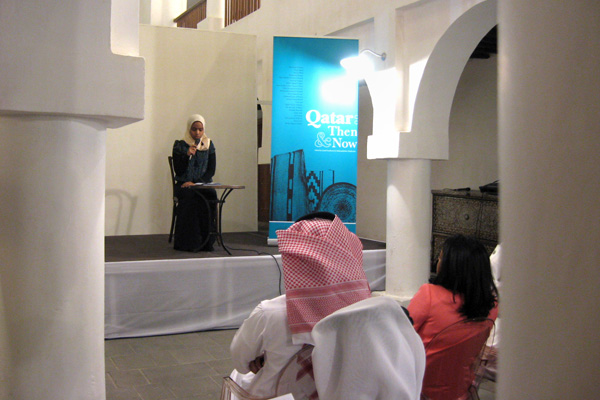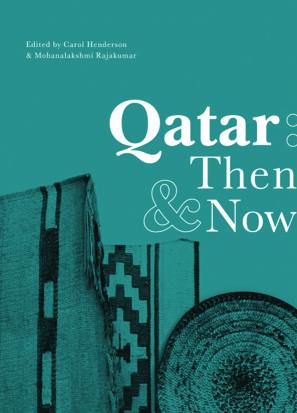WCMC-Q Students and Faculty Published in Groundbreaking Local Book Series
March 2009

WCMC-Q Pre-medical student Afaf Osman reads an excerpt from her
chapter, "Two Alphabets: One World" from the new anthology.
A crowd in Doha recently gathered to witness the release of a unique anthology of creative non-fiction work, a collaborative book project including works from three Weill Cornell Medical College in Qatar (WCMC-Q) students and one faculty member.
About 70 people gathered at the Waqif Art Center to celebrate the release of the second-ever published work of creative non-fiction in the country, and second book in the Qatar Narratives series: “Qatar: Then and Now.” The crowd sat silent as five authors, including WCMC-Q premed student Afaf Osman, read excerpts of their work in Arabic and English.
Their expressions broke the silence about how life is changing in Qatar—topics included revisiting the idea of early marriage, gender discrimination and the scramble to transform Doha’s cityscape from low-lying villages to a formidable skyscraper jungle in just a couple of decades.
Among the 22 non-fiction stories in the book are those by WCMC-Q students and faculty: Afaf Osman, a first-year premed student; Shaikha Daoud Al Shokri, a foundation student; Marwa Saleh, a second-year premed student; and Autumn Watts, WCMC-Q Writing Center’s coordinator.
The call for contributors to “Qatar: Then and Now” was open to locals as well as expatriates, people who’ve lived here their whole lives and those who have just arrived—a mix of voices and perspectives, said Mohanalakshmi Rajakumar, co-editor of the book and the founder of the Qatar Narratives series. A range of life perspectives unfold in the book, from takes on modern life, to straightforward reflections on local tradition.
“One of the reasons why [this book] is so important, is because there is very little space in this country for people to talk … things are moving so fast, and there’s no room for reflection,” Rajakumar said.

The second volume of the Qatar Narratives series,
Qatar: Then and Now, is available for purchase from
major book retailers in Doha.
Considering the phenomenal pace at which Doha, Qatar is developing—and its importation of a myriad of cultures—writers were eager to share what they’ve witnessed in terms of changes. In this age of globalization, their true accounts could apply to anyone, anywhere on earth.
“In general, the world is getting smaller and people are exposed to new cultures. Some people like to cling to the past. And some people get absorbed and lose their identities,” Afaf Osman said.
In the book, Osman explains how, although it’s not her first language, she found that English was a way to find a hidden vein of poetry within herself. Her words illuminate how various cultural aspects might be embraced and treasured while one remains true to their own past.
“This is a critical time for people in Qatar—they are opening up to the world and they have to make a choice between being traditional and being absorbed,” she said.
Marwa Saleh’s story focused on proactive efforts within the country to create community among members of its dynamic population. Her words described how a local institution, Qatar Foundation, is helping the older generation in Doha to see the benefit of the expatriate workforce.
“I wanted to document this influence of Qatar Foundation and its role in bringing up a new generation that is more accepting and open to the rest of the world,” Saleh explained.
“Qatar: Then and Now” is produced by the Waqif Art Center and edited by Rajakumar and Carol Henderson, program director of the North Carolina Writers Network in the United States. The book is available for purchase at Doha’s Virgin Megastore outlets, duty-free outlets and the Waqif Art Center.
Report by Emily Alp
